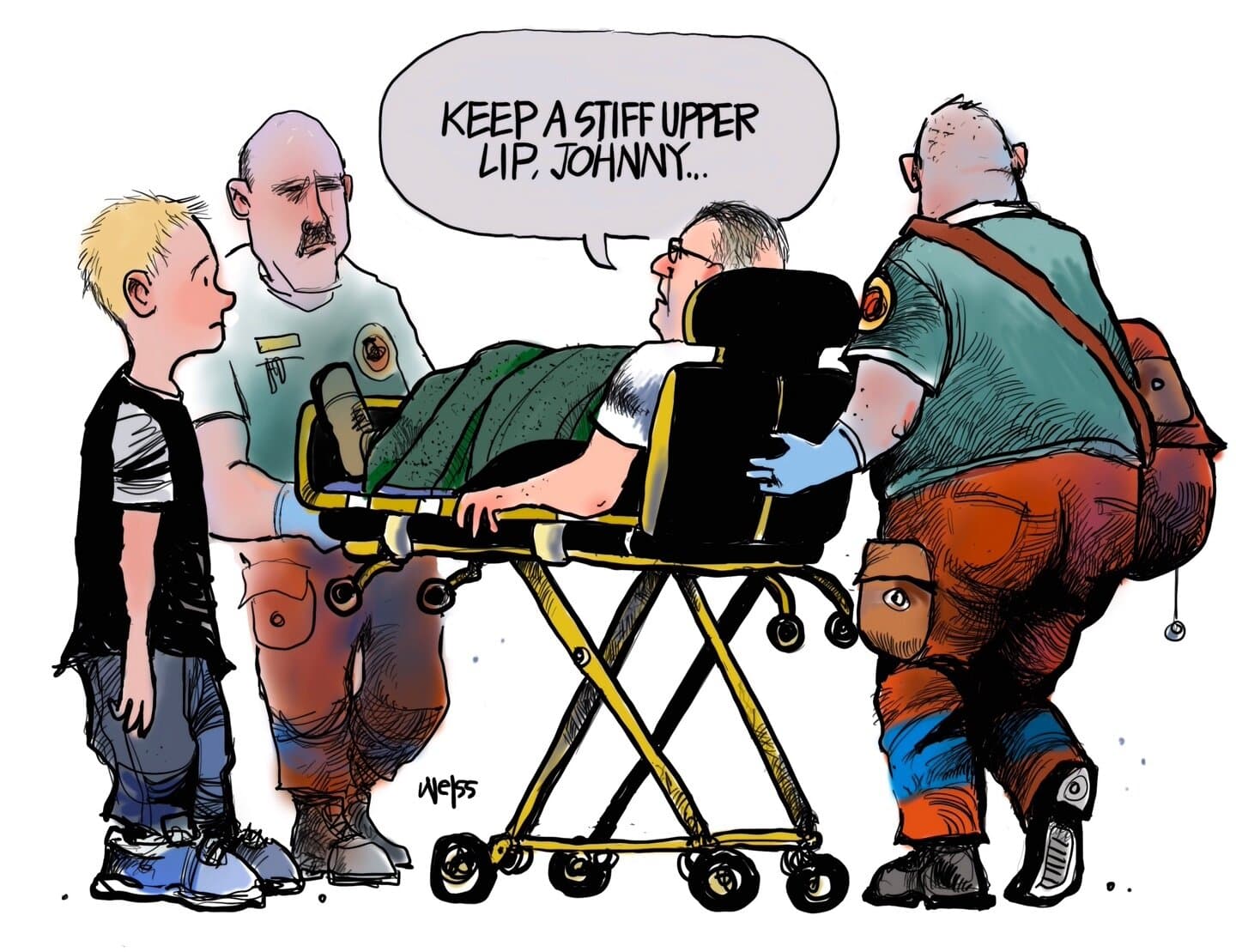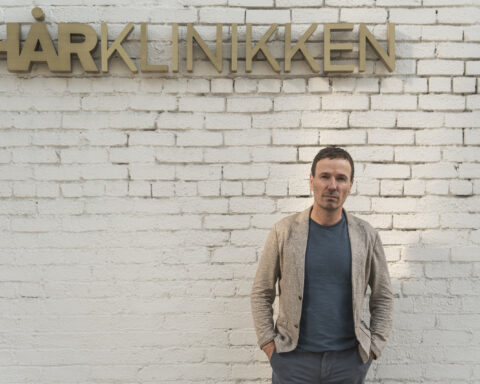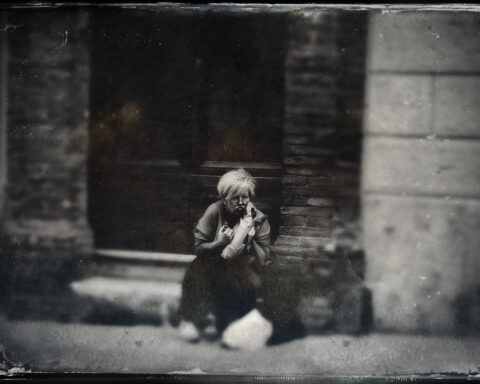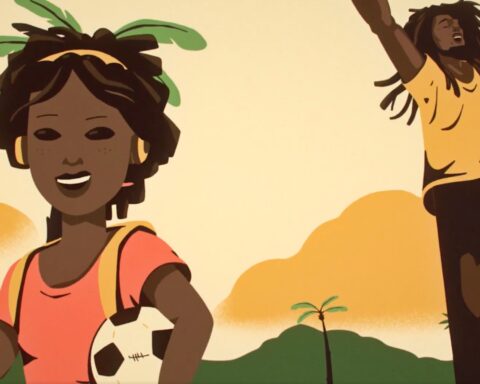When I was 13-years old my Dad had a heart attack in front of me.
We were at home in the living room and I was watching Star Trek on TV. Dad was reading in his chair, then suddenly leaned forward.
My mother walked into the room and immediately noticed my father’s pale face and perspiration.
“What’s the matter, John?” she said.
“I think it’s my heart,” Dad replied.
We moved Dad over to the couch and Mom called 9–1–1. Dad looked up at me and said, “Keep a stiff upper lip, Johnny.”
Thankfully, Dad survived his heart attack. Years later, he had bypass surgery, but otherwise, he remained in good health.
The entire incident left me with a form of post-traumatic stress syndrome. Any strange aches in my chest would set off anxiety, even though I knew I was perfectly healthy.
After reaching adulthood and entering the law enforcement profession, I felt I had come to terms with the trauma of my Dad’s heart attack. I felt I was over it.
Until the day a martial arts accident knocked my heart into super ventricular tachycardia.
FEAR IS THE MIND KILLER
I was fully conscious when they wheeled me into the Emergency Room. The doctor and her team hooked me up to various monitors and devices.
She asked me what happened. I told her I was in a jujitsu class doing a demonstration with the instructor for the new students.

John and his instructor, the late Professor Sig Kufferath
The instructor performed a routine throw, I landed on my side, and when I got up I felt strange. My heart was thumping irregularly.
Memories of my Dad’s heart attack and all the old fears came rushing back to my consciousness. I was frightened but determined to face my fear.
“I must not fear. Fear is the mind-killer. Fear is the little death that brings total obliteration. I will face my fear. I will permit it to pass over me and through me. And when it has gone past I will turn the inner eye to see its path. Where the fear has gone there will be nothing. Only I will remain.”–Frank Herbert, Dune
The doctor smiled and said, “John, what you’re experiencing is called an SVT. Your heart went out of rhythm. We’re going to fix that. Just try to relax.”
For the record, it’s hard to relax in an emergency room when your heart isn’t working properly. I closed my eyes and tried to slow my breathing.
The doctor injected a medication into the IV attached to my right arm, and I felt a kind of gentle flutter in my chest.
What I didn’t know, is that the doctor had just stopped my heart.
STRONG AND CALM
The medication the doctor gave me temporarily stops your heart so that it can reboot itself into a regular sinus rhythm. It wasn’t painful, and I’m glad the doctor didn’t tell me the medication’s purpose. Because I would have freaked out.
Next to the doctor was a nurse holding a syringe. I later learned that the syringe is filled with a different medication to be injected in case my heart failed to start.
If I knew about the purpose of the syringe, that would have freaked me out even more.
“You have to be strong and calm to overcome difficult moments.”-Dani Alves
Fortunately, the medication worked like a charm and I felt completely fine. The medical staff told me they have dealt with plenty of SVT patients. It’s scary to experience but treatable.
I was discharged, collected my things, and a friend drove me home.
MAKE SENSE OF OUR LIMITS
During the ride home, I laid back in the passenger seat. I was exhausted, no doubt from all the adrenaline, excitement, and fear.
My friend was making polite conversation, but I was distracted. Something inside of me had changed.
Weirdly, my old fear of heart-related problems was gone. But in its place was a strong desire to reevaluate my life and priorities.
“A healthy human environment is one in which we try to make sense of our limits, of the accidents that can always befall us and the passage of time which inexorably changes us.”-Rowan Williams
I had experienced other incidents with jujitsu. There were a few back injuries, and the usual bruises, cuts, and abrasions. But the SVT awakened something in me.
My friend dropped me off at my apartment and asked if I was okay. I said yes and thanked him.
Inside my apartment, I sat down at my drawing desk and looked at the cartoons and paintings on the wall.
I looked at the photos of my wife and son.
And I wept.
KNOWING YOURSELF IS THE BEGINNING OF ALL WISDOM
I asked myself “to what end?” am I training in jujitsu. I had no interest in tournaments or teaching martial arts.
My father taught me judo growing up, and a black belt buddy of mine in college trained me for years in the martial art of ninjutsu.
Adding to all that, I received nearly six months of police academy training in defensive tactics, as well as semi-annual refresher training. I was also a trained impact weapons instructor.
In short, I had nothing to prove and was more than able to defend myself. It was mostly my ego that kept me in the martial arts.
“Knowing yourself is the beginning of all wisdom.”-Aristotle
Being a goal-oriented person, I wanted to earn a black belt. But then what? The training was often exhausting and took me away from family and my creative passions.
My introspection led to the conclusion that I would quit jujitsu. I attended a few more classes after my injury but realized the passion I had for it was diminished.
I announced to my instructor and classmates that I was leaving the dojo. Everyone was understanding. While I would miss the camaraderie, I knew it was the right decision for me.
YOUR BODY IS SPEAKING TO YOU
After my medical event and quitting jujitsu, I started to focus on my health, passions, and family more. I improved my diet, got more sleep, spent more time with loved ones, and doubled down on my creative life.
I found I suddenly had a lot more time for family and my artistic pursuits. I was writing and drawing more. I realized my strongest talents were in the creative arts, not the martial arts.
This epiphany is one of the reasons I would later retire early to become a full-time writer and artist.

Here are three lessons I learned when they stopped my heart:
Lesson 1: Listen to your body and mind
A blog post in TinyBuddha.com notes:
“Whether you know it or not, your body is speaking to you all day long. It’s telling you on an ongoing basis what it needs to keep you healthy, comfortable, and happy.”
Sit quietly and observe if your body feels relaxed, stressed, hungry, fatigued, thirsty, or nervous? Examine your mental health and feelings. Then, make healthy adjustments.
The more I thought about jujitsu, the more I realized that I didn’t miss the training, pain, and time spent commuting to the dojo. Also, my body was telling me it had enough of the injuries and pain.
Lesson 2: Focus on your greatest passions
None of us know how much time we have on this planet. It’s important to prioritize how we spend our time.
It’s fine to experiment and try new things, but don’t neglect your passions. The things you are good at and love doing. They will sustain you in life.
“You just have to find that thing that’s special about you that distinguishes you from all the others, and through true talent, hard work, and passion, anything can happen.”-Dr Dre
Lesson 3: Embrace family and loved ones
When I quit jujitsu, two things happened. My body stopped hurting, and I was less grumpy, which my family appreciated.
Second, I was home more instead of commuting to the dojo and training for hours. I discovered how much my martial arts training took me away from family life.
“One’s family is the most important thing in life. I look at it this way: One of these days I’ll be over in a hospital somewhere with four walls around me. And the only people who’ll be with me will be my family.”-Robert Byrd
Healthy relationships require participation and effort. Your kids need you present and taking an interest in their lives. So does your spouse, and friends.
THE MOST INTROSPECTIVE SOULS
You don’t have to suffer a life-threatening medical event to improve your life. All you have to do is a little introspection.
Set aside regular time to review your life choices. How you’re spending your time? Where you are setting priorities? What brings you the most fulfillment?
“The most introspective of souls are often those that have been hurt the most.”-Shannon Alder
Focus on your health, loved ones, and passions. It’s a pretty simple recipe that will invite happiness, enrich your life, and feed your soul.
Read more from John P Weiss at johnpweiss.com











